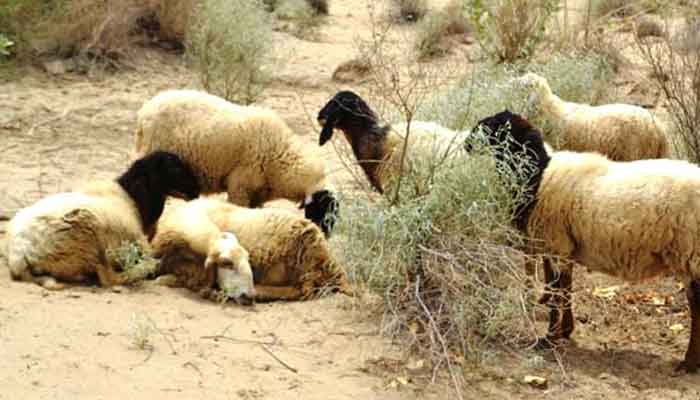Livestock vaccination drive begins in Tharparkar
The Food and Agriculture Orgnization of United Nations has launched a vaccination drive in Tharparkar District in collaboration with Sindh government. The drive was initiated to prevent livestock against Peste des petits ruminants (PPR) disease also known as ‘goat plague’.
KARACHI: Livestock and Fisheries department of the government of Sindh launched the PPR vaccination drive in district Tharparkar today. Abdul Bari Pitafi, the provincial minister for livestock and fisheries launched the campaign in collaboration with the Food and Agriculture Organization of the United Nations (FAO).
The vaccination will prevent livestock against Peste des petits ruminants (PPR) disease also known as ‘goat plague’. It is a viral disease of goats and sheep characterized by fever, sores in the mouth, diarrhoea, pneumonia, and sometimes death.
Emphasizing the importance of animal health for Tharparkar, Mina` Dowlatchahi FAO Representative in Pakistan said the vaccination will help ensure healthy livestock which will be instrumental in ensuring food security and sustainable livelihoods for the already drought stressed communities in the area.
She also said that a report of Sindh Drought Need Assessment (SDNA October 2018) conducted by FAO in collaboration with Natural Disaster Consortium (NDC) reveals that of the surveyed household, 25% of them reported death of their cattle; 21% in buffaloes, 53% in goats, 45% in sheep, 20% in camels 18% in donkeys, and 57% in poultry during past six months.
Tharparkar district hosts more than 20% small ruminant of province Sindh. The small ruminants are predisposed to multi-stress in the district which make them susceptible to lethal diseases like PPR. The disease can be eradicate through vaccination.
Speaking on the occasion, Farrukh Toirov, Deputy FAO Representative in Pakistan said target groups for proposed action includes subsistence livestock farmers, small-scale agriculture farmers and women headed households. The project will vaccinate 3 million small ruminants in Tharparkar and 1.2 million in Umerkot.
Drought in district Tharparkar directly affects the growth of vegetation as well as water resource for livestock, which in turn results in loss of animal production, and high mortality, which is a direct threat to food security and livelihoods.
-
Security forces gun down 30 terrorists in multiple IBOs in KP: ISPR
-
MQM-P calls for new province in Sindh
-
US report validates Pakistan military edge over India: PM
-
Banned TTP poses serious threat to Pakistan security: UNSC panel
-
CM Afridi clarifies remarks on by-poll after ECP requests army deployment
-
Dubai sees 3.2m Pakistani passengers in 2025 as airport sets new milestone
-
Security forces kill 23 Indian proxy terrorists in KP's Kurram
-
Pakistan to construct island to boost oil exploration: report












